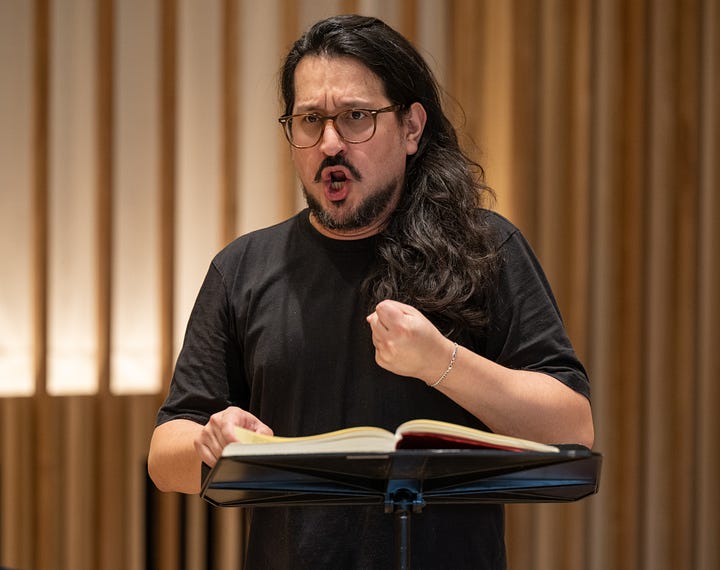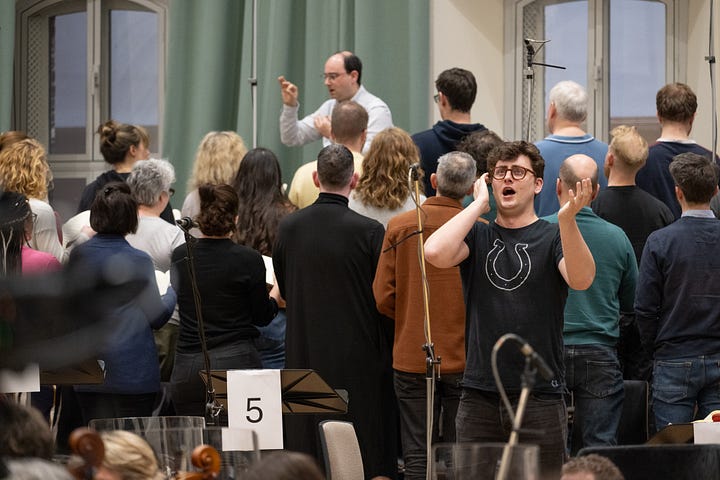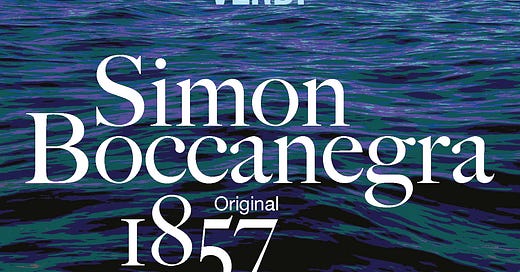On Disc: Simon Boccanegra 1857
Opera Rara challenges itself with a new recording from Mark Elder
Verdi often made revisions of his operas, translating them from Italian to French or vice versa as the need arose. With the two versions of Simon Boccanegra (1857 Venice/1882 Milan), it was less the practical consideration of re-working a piece for a different audience, more, perhaps a feeling that somewhere in the early version - a flop at its premiere - lay the makings of a salvageable masterpiece.
The original and revised versions of Simon Boccanegra are separated by more than 25 years, and by the time Verdi came to re-work it, he needed a new librettist. At a stage of his career when many thought, after Aïda in 1871, that he had effectively retired, he joined forces with the man who was to prove his greatest literary collaborator, Arrigo Boïto, a composer with one success behind him (Mefistofele) and librettist of Ponchielli’s La Gioconda, one of the few lasting hits of Verdi’s ‘silent’ period (1871-1882).
For this new studio recording of the 1857 Simon Boccanegra, Opera Rara find itself in the unusual position of having only itself as it ‘competitor’. Under the auspices of the record company’s late sponsor, the Peter Moores Foundation, Opera Rara released a 1976 radio broadcast of the early version, conducted by John Matheson, a regular in the pit at Covent Garden in those days, with a cast headed by Sesto Bruscantini (in one of his late-career Verdi assumptions) in the title role and the fine Welsh bass Gwynne Howell as his arch-enemy Fiesco.
In the recording studio: Mark Elder and The Hallé Picture © Simon Weir
This was one of a series of BBC studio recordings (before an invited audience) commissioned by Julian Budden, a leading British Verdi authority as well as Radio 3’s opera producer. Along with that Boccanegra, the 1847 Macbeth (starring Rita Hunter as Lady M), Les Vêpres Siciliennes and the St Petersburg La forza del destino (1865) became collectors’ items, thanks to Opera Rara’s lavish presentation comprising scholarly essays and a full libretto with English translation. Anyone who owns the Matheson Boccanegra need not throw it away, but there are several compelling reasons for acquiring the new one conducted by Mark Elder.
First and foremost, Elder conducts Roger Parker’s new critical edition of the 1857 score. As Parker writes in the booklet: “All previous versions [of the 1857 Boccanegra) had to rely on the near-contemporary vocal score and various manuscript copies. These sources…are reliable in reporting the notes Verdi wrote, but, in terms of dynamics, phrasing and other aspects of articulation, even the best of them is approximate, and frequently lacking in essential detail.”
It is the detail in Elder’s conducting of his old orchestra, the Hallé, that leaps out of the ‘grooves’ on this new recording. Elder is an 1857 Boccanegra veteran, having conducted a concert performance with the Orchestra of the Age of Enlightenment in 1995 and, two years later, a new production at Covent Garden. So his experience of the Ur-Boccanegra almost equals that of the 1881 revision which he conducted at English National Opera in 1987/88 and at the Royal Opera in 1998. No British conductor has engaged more with this ‘special case’ in Verdi’s output than Elder, who with the Hallé revels in the detailed instrumental colours of the score - less chiaroscuro perhaps in 1857 than 1881 - while the Chorus of Opera North, in lusty risorgimento voice, is another reason for preferring the new to the old.


Convincing pirate, imposing Fiesco: Germán Enrique Alcantara (Boccanegra), William Thomas (right) Pictures © Simon Weir
The principal singers are something of a mixed bag (as they are on the Matheson set): Germán Enrique Alcántara is especially convincing as the young pirate Boccanegra, his youthful Verdi baritone maturing well for the moving reunion with his daughter and the subsequent Coronation anniversary scene in the Ducal Palace of Genoa. His two confrontations with William Thomas’s imposing Fiesco are worth hearing. Thomas is young (early thirties) for this role, but Gwynne Howell was only a few years older for the Matheson recording: that version is more treasurable for the Welsh bass’s Fiesco than for the idiomatic but by then dessicated Boccanegra of Bruscantini.
On the new recording, the romantic couple are a bit of a let-down. Iván Ayón-Rivas, from Peru, has an undoubtedly exiting ‘Verdi tenor’ timbre, but he pushes his voice mercilessly - another of today’s youngsters who think they are the new Franco Corelli when they should be emulating (in this role anyway) Carlo Bergonzi. Eri Nakamura, by contrast, is a light-timbred, Gilda-weight Amelia/Maria, whose tone tends to curdle under pressure. She does some lovely things in ‘Come in quest’ora bruna’ but the sound is less alluring in ensembles when Amelia needs to channel the Trovatore Leonora. Among the comprimarii, Sergio Vitale (the only Italian in the cast) sings a pugnacious Paolo, while David Shipley’s sonorous bass serves well for his Plebeian sidekick Pietro.
No serious admirer of Verdi will want to miss Elder’s high musical values in this early version of a masterpiece, or Opera Rara’s exemplary presentation.
The cast: clockwise from centre: Eri Nakamura, Germán Enrique Alcántara, Iván Ayón-Rivas, Sergio Vitale, David Shipley, William Thomas, Beth Moxon Picture © Simon Weir
Simon Boccanegra Germán Enrique Alcántara Amelia/Maria Eri Nakamura Fiesco William Thomas Adorno Iván Ayón-Rivas Paolo Albiani Sergio Vitale Pietro David Shipley Ancella d’Amelia Beth Moxon
Hallé Orchestra, Chorus of Opera North (Anthony Kraus, chorus master) RNCM Opera Chorus (Kevin Thraves, chorus master)
Conductor Mark Elder
Opera Rara ORC65 (2 discs, full price, includes booklet and libretto)






